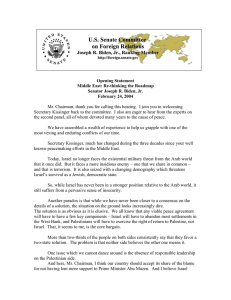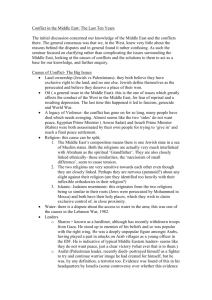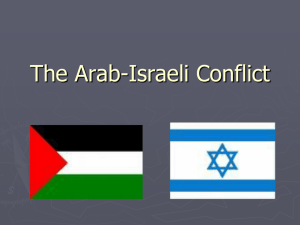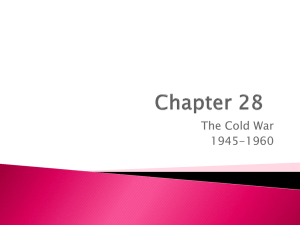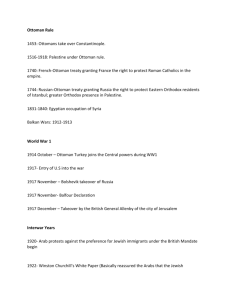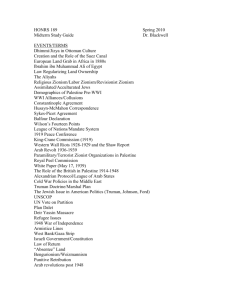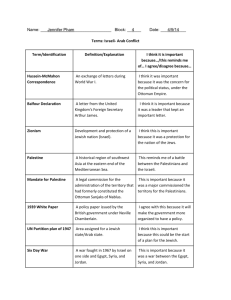Scheme of work – Cambridge IGCSE History (US) 0416
advertisement
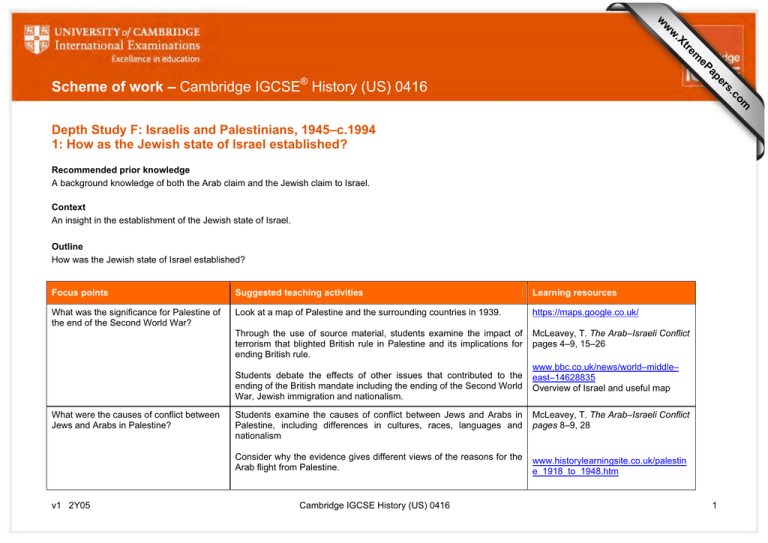
s er ap eP m e tr .X w w w om .c Scheme of work – Cambridge IGCSE® History (US) 0416 Depth Study F: Israelis and Palestinians, 1945–c.1994 1: How as the Jewish state of Israel established? Recommended prior knowledge A background knowledge of both the Arab claim and the Jewish claim to Israel. Context An insight in the establishment of the Jewish state of Israel. Outline How was the Jewish state of Israel established? Focus points Suggested teaching activities Learning resources What was the significance for Palestine of the end of the Second World War? Look at a map of Palestine and the surrounding countries in 1939. https://maps.google.co.uk/ Through the use of source material, students examine the impact of terrorism that blighted British rule in Palestine and its implications for ending British rule. McLeavey, T. The Arab–Israeli Conflict pages 4–9, 15–26 Students debate the effects of other issues that contributed to the ending of the British mandate including the ending of the Second World War, Jewish immigration and nationalism. What were the causes of conflict between Jews and Arabs in Palestine? v1 2Y05 www.bbc.co.uk/news/world–middle– east–14628835 Overview of Israel and useful map Students examine the causes of conflict between Jews and Arabs in Palestine, including differences in cultures, races, languages and nationalism McLeavey, T. The Arab–Israeli Conflict pages 8–9, 28 Consider why the evidence gives different views of the reasons for the Arab flight from Palestine. www.historylearningsite.co.uk/palestin e_1918_to_1948.htm Cambridge IGCSE History (US) 0416 1 Focus points Suggested teaching activities Learning resources Why did the Arabs reject UNO plans to partition Palestine? Look at the map previously used which now has the proposed UN Partition Plan marked. McLeavey, T. The Arab–Israeli Conflict page 19 Students discuss in groups the UNO plan for partition and then consider the question ‘Why did Palestinian Arabs reject the UN Partition Plan?’ A written answer to this question should be produced. www..historylearningsite.co.uk/israel_a nd_the_1948_war.htm Overview of causes of 1948 War http://avalon.law.yale.edu/20th_century /res181.asp UNO Resolution to partition Palestine Why was Israel able to win the war of 1948––9? Students examine the reasons why Israel was able to win the war of 1948–9 and present their findings under the headings of ‘Israeli strengths’ and ‘Arab weaknesses’ McLeavey, T. The Arab–Israeli Conflict page 20 www..jewishvirtuallibrary.org/jsource/Hi story/1948_War.html Overview of 1948 War with maps and sources Students revise the work completed at the end of this section and complete a past IGCSE question paper on this topic www.youtube.com/watch?v=5OhdZcz4 4U8 Three-part YouTube clip that covers the formation of Israel and the 1948–9 War. Past questions papers – can be accessed by logging onto the Cambridge Teacher Support website http://teachers.cie.org.uk v1 2Y05 Cambridge IGCSE History (US) 0416 2 Depth Study F: Israelis and Palestinians, 1945–c.1994 2: How was Israel able to survive despite the hostility of its Arab neighbours? Recommended prior knowledge A background knowledge of the Middle East since 1945. Context An insight into the ways in which Israel has successfully existed alongside her Arab neighbours despite hostility from neighbouring countries. Outline How was Israel able to survive despite the hostility of its Arab neighbours. Focus points Suggested teaching activities Learning resources Why was Israel able to win the wars of 1956, 1967 and 1973? In small groups students debate the reaction of the Arab states to their defeat in 1948–9 and the increasing involvement of Egypt in Arab– Israeli affairs. McLeavey, T. The Arab–Israeli Conflict page 20 Students, on pieces of card write the individual reasons for the causes of the Suez War of 1956. After discussion these should be ordered from ‘most important to least important’ with reasons being given for the choices made. McLeavey, T. The Arab–Israeli Conflict page 27 Following a teacher presentation, students write an essay to explain why Israeli was successful, but to a limited extent. www..youtube.com/watch?v=CyYm4h nzx1c 1956 War YouTube clip www.historylearningsite.co.uk/causes_ suez–crisis–1956 Overview Students using a variety of material produce a chart to show the causes, main events and outcomes of the wars of 1967 and 1973 and Israeli incursions into Lebanon. An answer to ‘How was Israel able to survive four major wars against her neighbours?’ should now be written. v1 2Y05 Cambridge IGCSE History (US) 0416 McLeavey, T. The Arab–Israeli Conflict page 29–36 www..youtube.com/watch?v=E63AKJp a1Tk Six-part YouTube video on 1967 Six Day War 3 Focus points Suggested teaching activities Learning resources www..youtube.com/watch?v=fzw2ff7b6 zU&feature=fvwrel Four-part YouTube documentary on 1973 War How significant was superpower involvement in Arab–Israeli conflicts? Students produce a mind map showing the significance of the involvement of the USA and USSR in the four Arab–Israeli conflicts between 1956 and 1973. McLeavey, T. The Arab–Israeli Conflict pages 20–36 www..mitpressjournals.org/doi/abs/10. 1162/152039706775212058?journalC ode=jcws PDF document from Journal on Superpower involvement. Variety of sources including cartoons provided by the teacher Why have Israel's neighbours become more ready to accept her existence? Students to produce a table to show the attempts at peacemaking between 1974 and 1993. The first column to identify the attempt, the second those involved and venue and the third the intended outcomes. ICT could be used. McLeavey, T. The Arab–Israeli Conflict pages 43–46, 52–32 Variety of sources including cartoons provided by the teacher By the 1990s, how far had the problems which existed between Israel and her neighbours been solved? v1 2Y05 Students consider the extent to which problems in the Middle East have been solved. Students consider the successes and failures and present their findings in a table. McLeavey, T. The Arab–Israeli Conflict pages 54–62 Students revise the work completed at the end of this section and complete a past Cambridge IGCSE question paper on this topic Past questions papers – can be accessed by logging onto the Cambridge Teacher Support website http://teachers.cie.org.uk Cambridge IGCSE History (US) 0416 4 Depth Study F: Israelis and Palestinians, 1945–c.1994 3: What was been the impact on the Palestinians of the existence of Israel? Recommended prior knowledge A background knowledge of Israeli–Palestinian conflict. Context An insight into the response of Palestine to Israel’s existence. Outline What has been the impact on the Palestinians of the existence of Israel? Focus points Suggested teaching activities Learning resources Why were so many Palestinians refugees? Students study a variety of pieces of evidence relating to Palestinian Refugees to consider why there are so many, why Israel will not allow them to return. What was life like in the refugee camps. Students could also explore whether the evidence explains why some became Fedayeen. McLeavey, T. The Arab–Israeli Conflict pages 21–26 How effective has the PLO been in promoting the Palestinian cause? Students investigate the formation and activities of the PLO. activities could be presented in the form of a chart or diagram. McAleavy, T Twentieth Century History: International Relations since 1919 page 142 The Students consider the extent to which this was successful in promoting the Palestinian cause, including the violent tactics and the role of Arafat and world opinion. Students may wish to hold a discussion – ‘Were members of the PLO terrorists or freedom fighters.’ McLeavey, T. The Arab–Israeli Conflict pages 7–42 http://news.bbc.co.uk/1/hi/events/israel _at_50/history/78655.stm Overview of PLO www..meforum.org/1237/the–plo–and– israel Links to various articles on PLO and Israel Why have Arab states not always supported the Palestinians? v1 2Y05 Students investigate the nature of Arab states’ perception of Palestinian tactics towards Israel and consider the reasons why they Cambridge IGCSE History (US) 0416 McLeavey, T. The Arab–Israeli Conflict page 42 5 Focus points Suggested teaching activities Learning resources haven’t always supported them How have international perceptions of the Palestinian cause changed over time? Students consider the viewpoints of international governments towards the Palestinian cause and maps the changes in attitude to the Palestinian cause by governments both in the Middle East and internationally. Students revise the work completed at the end of this section and complete a past Cambridge IGCSE question paper on this topic v1 2Y05 Cambridge IGCSE History (US) 0416 Past questions papers – can be accessed by logging onto the Cambridge Teacher Support website http://teachers.cie.org.uk 6 Depth Study F: Israelis and Palestinians, 1945–c.1994 4: What has been the effect of the Arab–Israeli conflict on life in Israel? Recommended prior knowledge A background knowledge of Arab–Israeli conflict. Context An insight into the effects of continuing conflict on the lives of Israelis. Outline What has been the effect of the Arab–Israeli conflict on life in Israel? Focus points Suggested teaching activities Learning resources How has the hostility of her Arab neighbours influenced the lives of the people of Israel? Students consider the extent to which the lives of Israelis have been affected by the hostility of its Arab neighbours. These factors could include social organisation, national service and increased security. McLeavey, T. The Arab–Israeli Conflict Students find out the reasons for the Palestinian uprising in the occupied territories and the effects of the Intifada. What has been the political significance of Judaism within Israel? Students investigate how united are the Jewish people of Israel. the results to be presented in a chart under headings including the impact of Labour, the struggle between Labour and Likud, the impact of religion and settlements on the West Bank. McLeavey, T. The Arab–Israeli Conflict pages 47–51 www..jewfaq.org/israel.htm Good links to articles on Judaism www..virtualjerusalem.com/ Good articles and resources on Judaism in Israel What differences have existed amongst Israelis about how to treat the Palestinians? Students, in small groups, carryout a brainstorming exercise to consider the difference of how to treat Palestinians has changed over time. Have Palestinians within Israel and the Students, using source material explore the extent to which v1 2Y05 Cambridge IGCSE History (US) 0416 McLeavey, T. The Arab–Israeli Conflict pages 47–51 7 Focus points Suggested teaching activities occupied territories been more or less fortunate than Palestinians in exile? Palestinians living in Israel have been more fortunate than those living in exile. Produce a montage to show life in the occupied territories. Students revise the work completed at the end of this section and complete a past Cambridge IGCSE question paper on this topic v1 2Y05 Cambridge IGCSE History (US) 0416 Learning resources Past questions papers – can be accessed by logging onto the Cambridge Teacher Support website http://teachers.cie.org.uk 8
